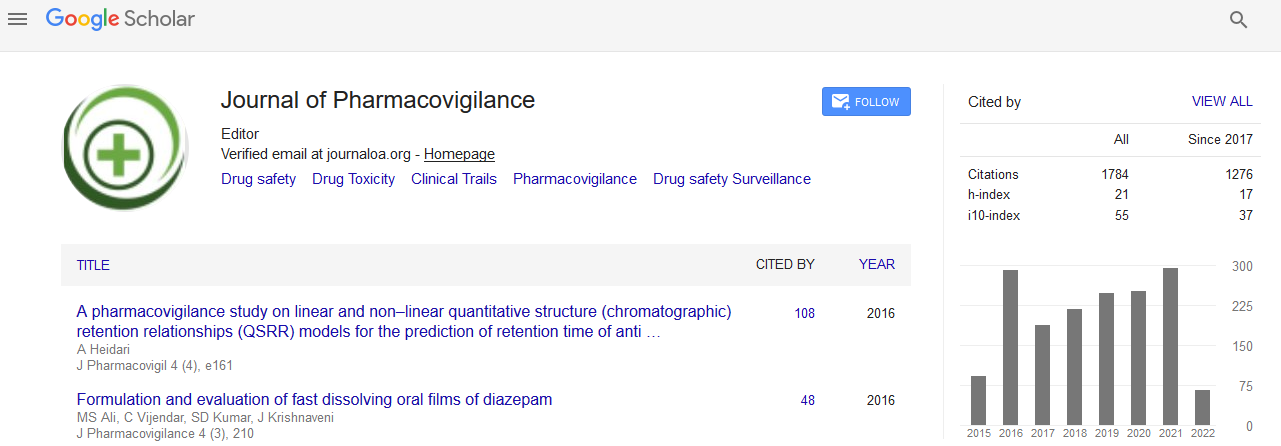Indexed In
- Open J Gate
- JournalTOCs
- The Global Impact Factor (GIF)
- RefSeek
- Hamdard University
- EBSCO A-Z
- OCLC- WorldCat
- Publons
- Euro Pub
- Google Scholar
Useful Links
Share This Page
Journal Flyer

Open Access Journals
- Agri and Aquaculture
- Biochemistry
- Bioinformatics & Systems Biology
- Business & Management
- Chemistry
- Clinical Sciences
- Engineering
- Food & Nutrition
- General Science
- Genetics & Molecular Biology
- Immunology & Microbiology
- Medical Sciences
- Neuroscience & Psychology
- Nursing & Health Care
- Pharmaceutical Sciences
Assessing cancer risks associated with DPP 4 inhibitors: Role of FAERS in cancer control and prevention
2nd International Conference and Exhibition on Pharmacovigilance & Clinical Trials
November 18-19, 2013 Hilton San Antonio Airport, TX, USA
Xiaodong Feng, Amy Cai, Kevin Dong, Wendy Chaing, Nilesh S. Bhutada, John Inciardi and Max Feng
Scientific Tracks Abstracts: J Pharmacovigilance
Abstract:
Background: The Food and Drug Administration Adverse Event Reporting System (FAERS) represents one of the most successful digital tools of media landscape sponsored by the government. Using the FAERS, clinicians have uncovered many critical drug safety issues that create significantly impact on patient care and patient support. However, the role of the FAERS in cancer control and prevention in the changing media landscape and new information ecology remains largely unknown. Methods: Using the FAERS public database, the adverse event reports (ADRs) associated with widely used anti-diabetic drugs of dipeptidyl peptidase 4 (DPP 4) inhibitors were generated and evaluated. Standardized pharmacovigilance tools were applied to detect the signal for cancer risk. Based on the AERs from 2007 to 2011, reported cancer adverse events associated with DPP 4 inhibitors were analyzed. Results: Among 12618 ADRs associated with sitagliptin from 2007 to 2011, there were 223 cases of cancer. There was a significant correlation between the cancer proportional reporting ratio and the time (R=0.796, P<0.001). Pancreatic cancer, leukemia, lung cancer, breast cancer and bladder cancer were the top five most prevalent cancers reported. Pancreatic cancers accounted for 22% of all combined cancer adverse events. Pharmacovigilance assessment indicated that there was a significant association between pancreatic cancer and DPP 4 inhibitor treatment. Conclusion: There is a significant increase in cancer reports associated with DDP 4 inhibitor treatment. Considering the limitation of the FAERS, this study signals the potential cancer risk associated with DPP 4 inhibitor drugs. These findings may provide future directions for clinical studies of cancer control and prevention.
Biography :
Xiaodong Feng has his Ph.D. in Cellular and Molecular Physiology and PharmD in Pharmacy Practice. He started his biomedical research career a decade ago as a postdoctoral fellow in Wound Healing Center, School of Medicine at Stony Brook. After three years of fellowship, he did research and teaching as an Assistant Professor in Department of Dermatology at the State University of New York in Stony Brook for another 4 years. He has twelve years of clinical research experience in cancer, wound healing, and cardiovascular diseases. He has current pharmacy practice experience in both hospital and community pharmacy. His research, teaching and pharmacy practice experience enables him to integrate drug topics and patient case studies to basic sciences. His unique background enables him to integrate biochemistry, physiology and pathophysiology to his pharmacy practice, which also enables him to do translational research to bridge the gap between basic clinical research to patient care. Angiogenesis and Cancer are his central concentrations of research. His current research projects study the potential role of diabetic drugs and heparin related oligosaccharides in the regulation of angiogenesis, which is critical for pathogenesis and treatment of chronic wound, diabetic retinopathy, cardiovascular diseases, Alzheimer disease, cancer and pregnancy. The vision is that angiogenesis-based therapies are a unifying approach to diseases and will have the same impact in the 21st century that antibiotics had on disease in the 20th century.


